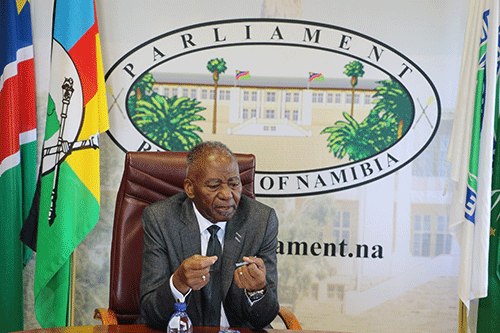George Sanzila
Speaker of the National Assembly Peter Katjavivi says even though Namibia’s contribution to greenhouse gas emissions is negligible, it continues to bear the brunt of climate change.
Katjavivi mentioned this recently during a debate at the ongoing Inter Parliamentary Union (IPU) 144th Assembly taking place in Bali, Indonesia.
This year’s assembly is held under the theme “Getting to zero: Mobilising Parliaments to act on climate change”.
According to Katjavivi, Namibia continues to be negatively impacted by the effects of climate change despite its low carbon footprint.
“Namibia does not contribute significant amounts of greenhouse gasses to global emissions. However, our population is negatively impacted by the emissions of other countries. We have already started to experience the impact of climate change with a long period of drought that lasted five to seven years in most regions of the country and increased flooding in some areas this year, as the drought ended,” noted the speaker.
He noted that the calamity has further disrupted the Namibian economy and the livelihood of ordinary people as the majority of citizens heavily rely on agriculture to survive.
“It is estimated that the mean annual temperatures in Namibia will sill increase further in the next decades and that annual rainfall will decrease. The impact is mostly felt in the agriculture sector as Namibia exports beef to Europe, Asia and lately the USA. This sector is threatened by climate change. Furthermore, the majority of Namibians rely on rain fed agriculture and livestock production and are thus extremely vulnerable,” said Katjavivi.
Katjavivi pleaded for close collaborations between countries and for a multi sectoral approach that would result in strategies aimed at resolving the crisis.
“I would like to emphasise the need for countries to work in partnership with each other towards developing strategies that reduce vulnerability to climate change and improve adaptive capacities. Our policies need to ensure the participation of women, children and other vulnerable groups and offer training and appropriate local knowledge for adaptation,” said the speaker who is also accompanied by two members of the Namibian Children’s Parliament.
The speaker further noted that Namibia has its own legal framework, known as the National Climate Change Policy that is regularly reviewed and aimed at addressing issues of climate change.
Another strategy to reduce the effects of climate change, said Katjavivi is the recently introduced Green Hydrogen initiative by President Hage Geingob, which is meant to reduce the country’s reliance on non-renewable energy sources.
The IPU Assembly is a global organisation of parliaments that brings together lawmakers to identify international challenges and make recommendations for action.



